Josh Dun on humble beginnings, hit records and the monster success of Twenty One Pilots
Drummer for 2016's hottest band speaks
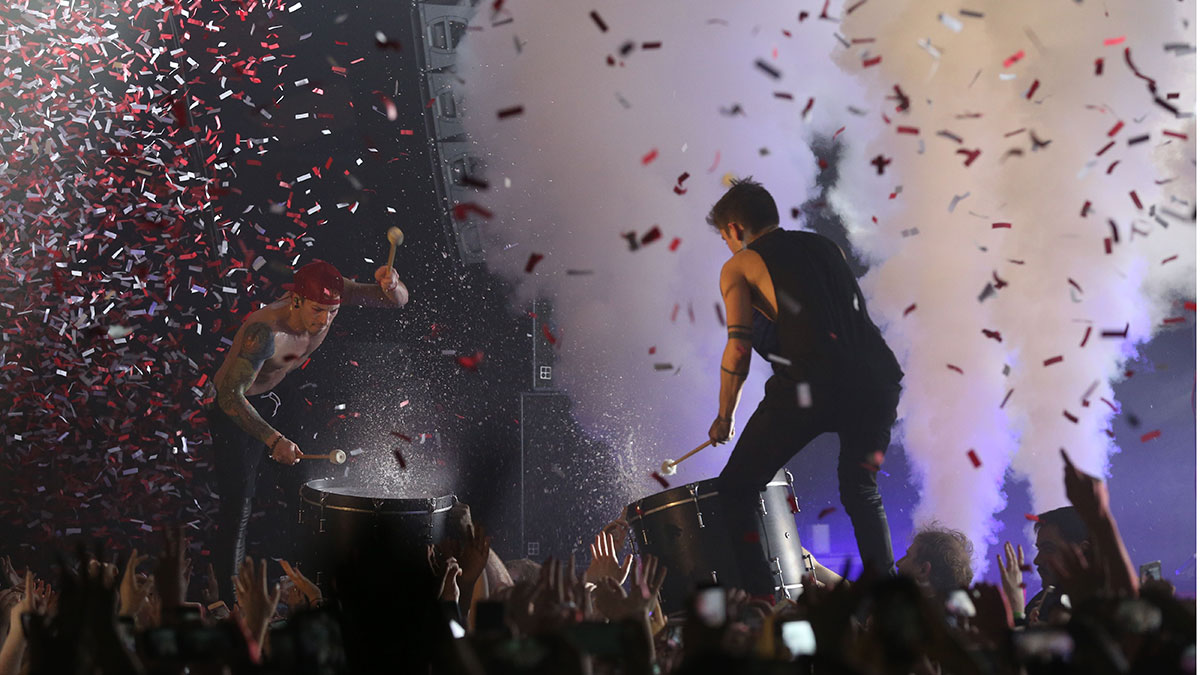
"I would lay in my bed every night with sticks and hit my knees trying to figure out what they were doing."
Just in case we were in any doubt of the globe-trotting world of Josh Dun, we quickly learn of the Twenty One Pilots drummer's rammed schedule as we're told that our phone interview will be delayed as he hasn't quite made it through airport security yet.
An artist handling press interviews the moment they land for the latest leg of their world tour (in this case Josh has just touched down ahead of the band's batch of Canadian shows) is admirable, but it also demonstrates the whirlwind that the drummer is currently in the thick of.
Since joining forces with Pilots frontman Tyler Joseph in 2011, Dun has enjoyed a rapid rise, culminating in the band's second full-length record, 2015's Blurryface shipping north of three-quarters of a million units in less than a year. Stressed Out, the infectious third single from the album, has clocked up a jaw-dropping 250 million plays (and counting) on Spotify, and while that may not translate into the big bucks that you might initially think, it's fair to say the band is doing something right.
For Josh his journey to the globe-covering adoration that he is now experiencing began with, er...the trumpet.
“I don't really know what it was about the trumpet that I loved but the church I went to with my parents growing up was traditional where they'd have an orchestra with brass and woodwind instruments,” he says. “For whatever reason I was always so drawn to the trumpet.”
Josh's jazz-loving grandfather would take him to performances when the genre's big names rolled into town, allowing the youngster to witness some stunning shows. Inspired, Josh picked up trumpet lessons at school, but looking back today he admits that the whole process of regimented learning eventually left him cold.
“I played trumpet for three or four years and I got okay at it, I was never awesome at it though,” he admits.
“I got into sight reading and near the end of my time playing trumpet I realised that all I could really do was read notes off a sheet of paper. There wasn't anything really special about that to me. I had learnt a very specific way and I didn't know how to take that and be creative with it and create my own songs or music because all I had learned was how to read it.”
Here's when the drums enter the picture. In search of an instrument that he could take the self-taught route with, Josh turned his attention to the kit.
I wanted to get to a place where I could create my own way of playing and not having somebody telling me what was the right and wrong way to play the instrument
“I became really interested in drums and I think it was important for me that I taught myself how to play drums because of this realisation that somebody else teaching me how to play an instrument in my mind at the time was kind of prohibiting me from being creative,” he explains.
“I wanted to take it on myself and I wanted to define my own style. I wanted to get to a place where I could create my own way of playing and not having somebody telling me what was the right and wrong way to play the instrument.”
The way that Josh set about self teaching was through devouring video upon video of drumming's great and good, studying and picking apart every last beat.
“I would lay in my bed every night with sticks and hit my knees trying to figure out what they were doing, like, 'Okay, now they're hitting the ride cymbal, and now it's the snare and now the crash.' I would dissect everything that I watched or listened to.
"Every day I would walk to the local music store and play their electronic drums until one of the workers would be like, 'Hey, we have people in here that actually want to buy stuff so you've gotta go.' I did that for about a year and that's essentially how I learned to play some basic beats.”
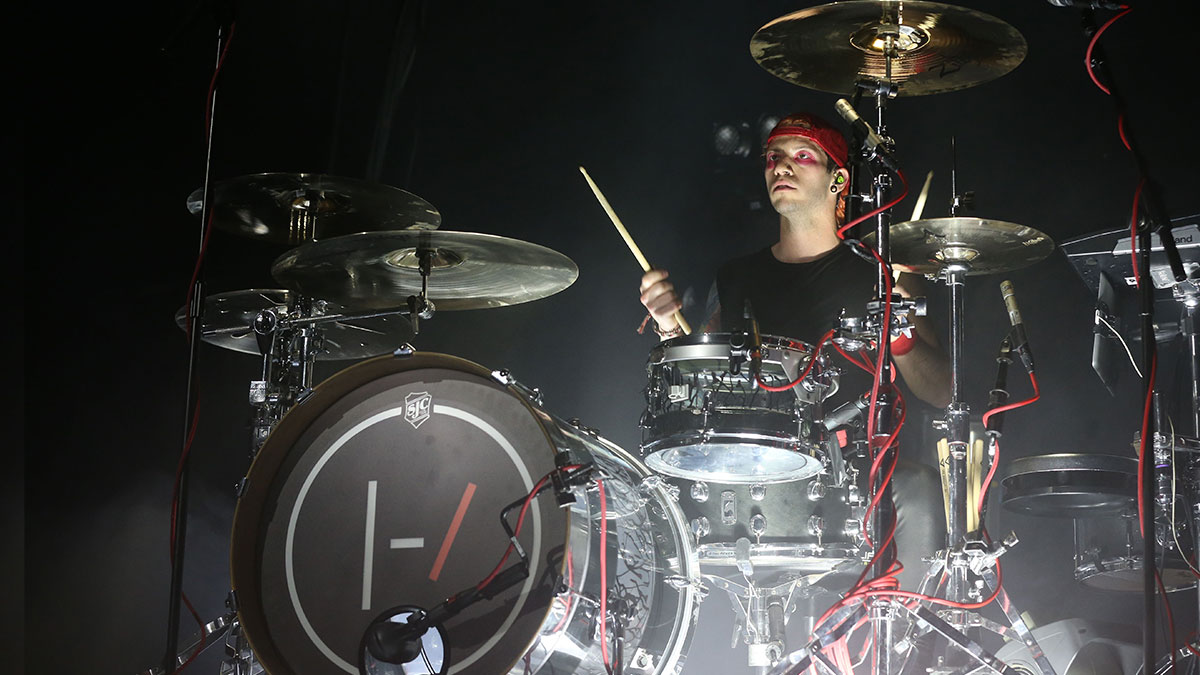
"We stayed up until eight or nine in the morning just talking about our dreams and goals musically and our personal visions."
With basic beats nailed Josh formed a band, and unbeknownst to him his future bandmate was already keeping tabs on him.
“I met Tyler probably beginning of 2010. I was playing in a local band and he was playing with some other guys. We were introduced by one of the guys he was playing with. He was playing a show with my friend and I went to see them. Instantly I felt a musical connection before I'd even spoken to him. I felt that just from seeing how he uses music and how he interprets it. It felt very similar to how I viewed music. That was really cool. I introduced myself after the set and he already knew who I was because he had been following what I had been doing musically for a while and he suggested we should hang out.”
The pair quickly developed a strong friendship and their musical kinship was evident right from the off.
“A few days later we were hanging out and we stayed up until eight or nine in the morning just talking about our dreams and goals musically and our personal visions. That kind of thing can be pretty vulnerable to talk about your dreams, especially if you have big dreams and you're sharing that stuff with somebody you've just met. We were both very open about that stuff and from then we knew that we wanted to play music together. At that time though we were obligated to other projects so we were just friends for about a year without playing music together.”
I remember thinking that this was a guy I hang out with everyday and we had talked about the idea of playing music together. When it finally got to that time it was like, 'Oh my gosh, yeah!'
By the time early 2011 rolled around Tyler was looking for a new musical collaborator after the departure of early Twenty One Pilots bandmates Nick Thomas and Chris Salih. The multi-instrumentalist put out the call to his pal Josh, and the drummer was more than ready to accept.
“I remember thinking that this was a guy I hang out with everyday and we had talked about the idea of playing music together. When it finally got to that time it was like, 'Oh my gosh, yeah! Let's do this, it's going to be awesome.'”
While the seeds of a multi-million record selling band had just been finally sown, Josh and Tyler were initially restrained with their expectations. While the duo had creativity flowing out of every pore, they were acutely aware that riches would not come in a hurry.
Josh laughs, “From a financial standpoint in the beginning we had no money, the goal was eventually to make some money but at that point we just wanted to not lose any money.”
The band took the first steps by getting on a tried and trusted path, jumping in a van and hitting the road. Both guys would work through the week to cover living costs and allow them to play shows on Friday, Saturday and Sunday nights. But, while many a new band has been champing at the bit to head all over the map, the Pilots had a different approach.
“We would stay local because a lot of bands would have some music and then go on tour. They would travel around the country, essentially wasting money because you have to pay for gas and hotels to get paid hardly anything and play for nobody.”
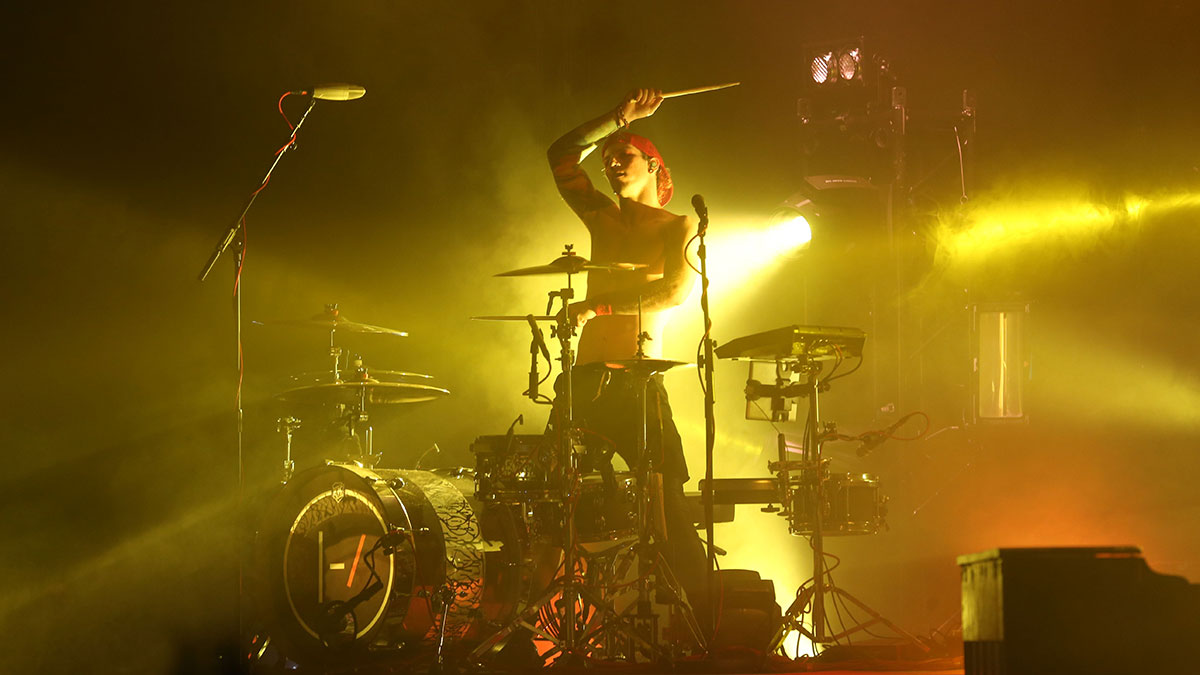
"We sold 1,500 tickets...That's still one of the most memorable days of my life."
In hindsight, the band’s slow and steady approach was an astute move. By staying local they could make sure they packed every single show with friends and family, right? Again, that wasn't quite the way Josh and Tyler saw it.
“We didn't really promote our shows, we never put it up on Facebook or Tweeted about them. The reason was that we had a very specific idea about what we wanted our shows to look like for our fans. The last thing we wanted to do was to have our new fans driving an hour and a half to a gig that honestly really wasn't going to be very good. A lot of times we played for between 15 and 50 people but the goal was to play in front of people who had never seen us before and to win those people over. Over the course of eight or nine months we did that every single weekend.”
The last thing we wanted to do was to have our new fans driving an hour and a half to a gig that honestly really wasn't going to be very good
Again, this proved to be a masterstroke. Rather than playing to friends, acquaintances, aunts, uncles and beloved pets, Josh and Tyler were able to build a fanbase off their own back through hard work and word of mouth. When they finally did put word out to family and friends about a show in their hometown of Columbus, the result was staggering.
“This was the show that we decided to promote and push on Facebook,” says Josh. “We've all been on Facebook and had dozens of event invitations, you'll get bands saying, 'Hey come to our show states away from where you live.' You're not going to travel states away from where you live for a show so you just end up dismissing all of the notifications from a band that does that. We never did that. Finally we had this one show that we blasted everyone with and that made more of an impact. On the day of that show a friend called us around noon saying he was trying to get tickets but it had sold out. I was like, 'Nah, that can't be right, I'll call them and make sure it's all good.' I called and the venue told me that it had sold out and they could open up 400 more tickets but they couldn't let any more people in that that because of fire codes. We did that and later that day they sold all 400 of those tickets so we had sold 1,500 tickets for our show. That's still one of the most memorable days of my life.”
That would turn out to be just the beginning of a succession of memorable moments for Josh. Within a week of the show the band was being inundated with calls from record labels looking to fly them out to New York or Los Angeles to ink a deal. They eventually went with renowned punk label Fueled By Ramen, the Warner-owned label distributed by Atlantic Records and co-founded by Less Than Jake drummer Vinnie Fiorello. A year later they released their first album on their new label, Vessel.
Tracks like the lo-fi hip hop Car Radio and Guns For Hands with its quick-fire, disco-beat hi hats helped the record hit charts worldwide. The album, and its 2015 follow-up Blurryface, are packed full of percussive twists and turns, almost a necessity given the waves of instrumentation tackled by Tyler.
While your first thought of a two-piece might involve stripped-back beats locking in with sparse guitar or basslines, Josh weaves his beats into pockets created with, and left open by, Tyler's vocals, guitar, piano, electronics and god knows what else he's playing on these densely-layered tracks.
It could represent a complicated juggling process for some, but Josh reckons the key is to keep playing live in mind when writing beats to back up these musical soundscapes.
“From the beginning while we've been writing we've always looked at a song from a live perspective,” Josh says of the band's approach to penning new material.
“While we sit down to work on a song we're really picturing what it's going to be like on stage and how it will sound for someone right in the middle of the audience. We think that maybe we can make this part longer so we can walk over the stage and do something with the crowd at this point.
"We've always looked at writing like that. Since the beginning of this whole thing the only way we've really known to make any sense of impact was put on an entertaining show and do something a little bit different to what everyone is used to seeing.”
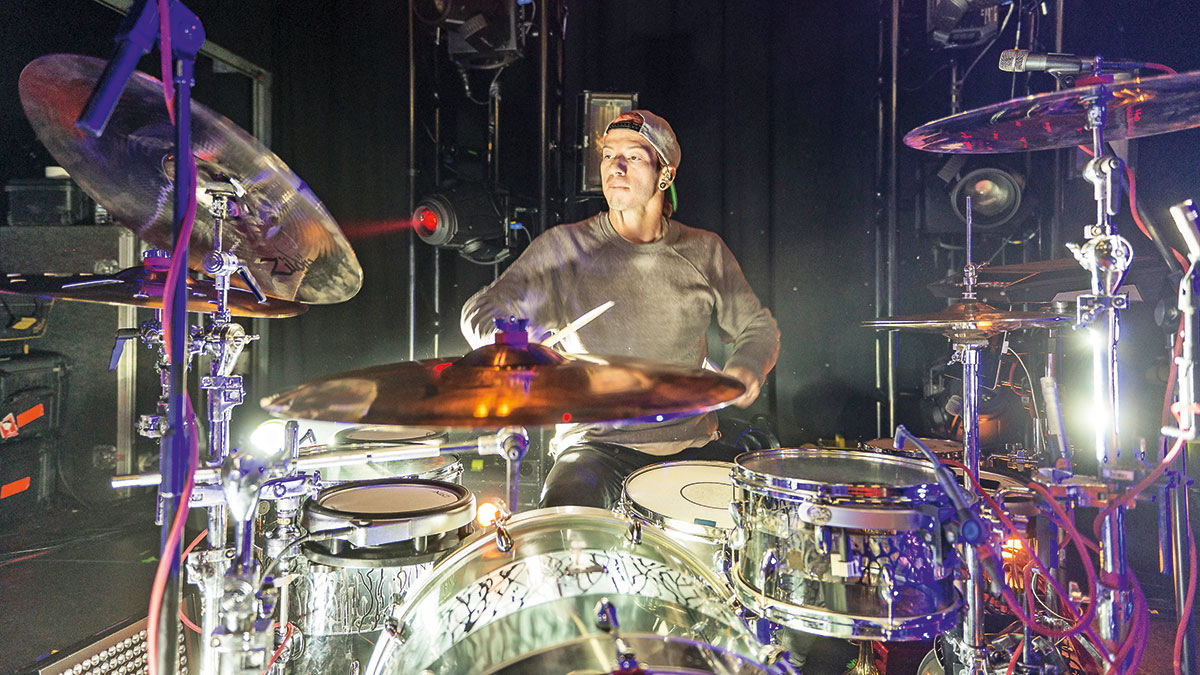
"The strongest form of marketing is someone telling you about a band that they love."
One thing you can't help but notice both live and on stage is the presence of electronics in the Pilots' music, whether it be keys, samples or the pads tucked within Josh's live kit.
“I think now we're in a culture and an age musically where electronic drums are so prevalent in all kinds of music, even in rock music,” he says.
“Electronic samples are used so much, especially in hip hop where samples are used pretty much exclusively used in terms of drumming. Being aware of that in the studio you'll be thinking whether a song calls for samples or an electronic kit and sometimes it does and sometimes that will feel better than live drums on a song.
"I've implemented some electronic mixes within my acoustic kit live. I've got the Roland SPD-SX pad. Almost every drummer uses that so I wanted to separate the drums a little bit so I could do something a little bit more pleasing to watch. I have three Yamaha pads, one to my left and two to my right.”
But don't be fooled into thinking that Josh is triggering all manner of tracks so he can put his feet up at the back of the stage.
“One of my pet peeves is when I'm watching a show and there's electronic beats or drums going on in the background but there's nobody playing it. I try to make sure that whenever there's any sort of drums happening that I am playing them in some fashion. That might be replacing the electronic sounds from the record with acoustic sounds live or just playing the samples on the pads that I have. I just want to make sure that I'm playing it or triggering every percussive sound that you hear at our show.”
Thanks in no small part to their expertly-honed live performances and two records packed-full of killer tunes, Josh and Tyler have tasted staggering success in the last two years. The aforementioned big hitters Stressed Out and Car Radio brought the band an army of fans, but cuts like Blurryface opener Heavydirtysoul with its big, simple crash-snare formula, Lane Boy and its straight-up hip hop groove that transforms jarringly into electronica breakbeats and the ska-reggae-turned-mainstream-pop of Ride cemented their place as ground-breaking modern-day superstars.
YouTube : “One of my pet peeves is when i'm watching a show and there's electronic beats or drums going on in the background but there's nobody playing it.
Any band that can dart stylistically from early Eminem to Empire of the Sun via vintage Pixies all within a single song deserves a lorryload of plaudits, and that's exactly what Twenty One Pilots have been bestowed with. Today, Josh reflects that while the band's 'overnight success' came off the back of several years of hard-graft, they have enjoyed a startling rise, one that leaves them in that whirlwind of chatting to us fresh from jumping off a Transatlantic flight.
“During the process Tyler and I didn't feel like it happened really quickly. We were working really hard for a few years to try and build this thing. We played so many shows where two people turned up. We played shows to 30 people and we were carrying drums up flights of stairs to play these gigs to no people.
"Looking back now in the grand scheme of things it did all happen rather quickly. We played shows where people really connected and resonated with the songs and we built a fan base from our live show.”
As our time on the phone with Josh comes to an end we ask why he thinks his band have connected with so many people, and it comes back those early shows and building up an organic fanbase, one person at a time. It turns out that the trick to becoming the hottest new band on the planet is to work damn hard at it, who knew?
“I believe the strongest form of marketing is someone telling you about a band that they love, you'd be more inclined to check that band out than if you saw a billboard for that band. That's what happened to us, people shared our music and they believed in it, that's how this thing has grown.
"By the time Blurryface came out, which is not that long after we started this whole thing, but by then there was enough people into us to make some noise and allow us to make a splash. It has been a snowball type thing since then. It's crazy to look at where it is right now, but it's really cool and it's a testament to people sharing the music.”
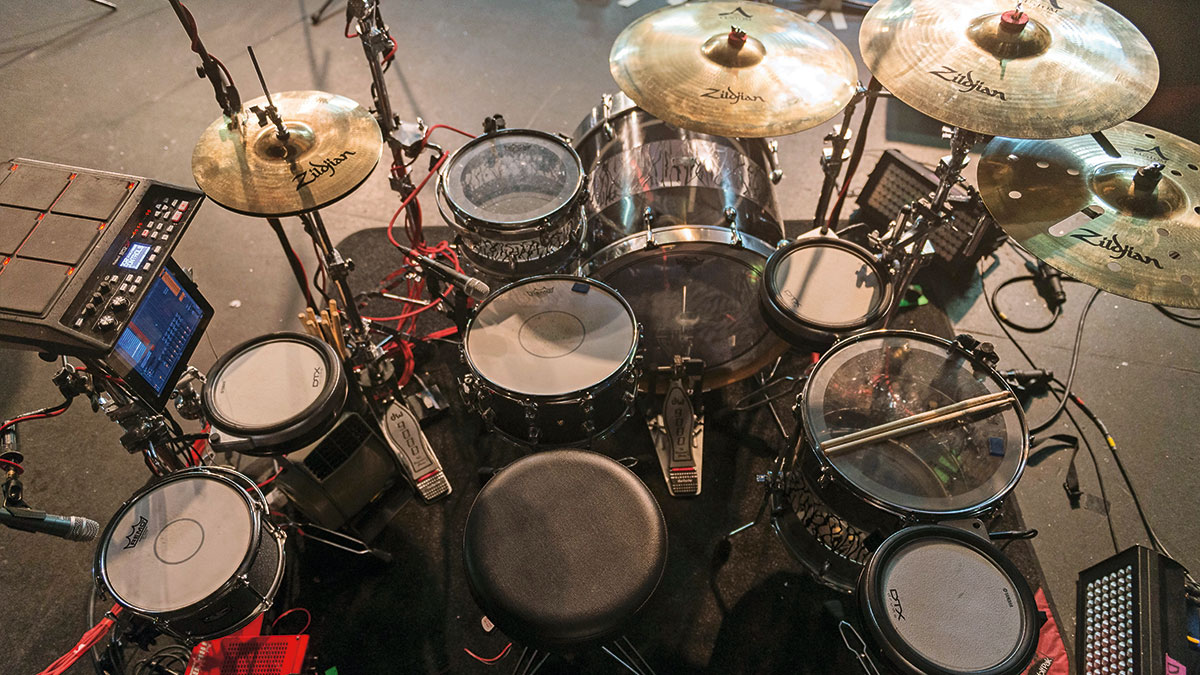
Josh's Kit
SJC Drums – Red Acrylic
24”x20” bass drum
12”x7” tom
16”x16” floor tom
14”x7.5” mahogany snare drum
10”x6” maple snare drum
Zildjian Cymbals
22” A Custom Ping ride
20” A Custom crash
19” A Custom cash
18” EFX cymbal
14” A Custom hi hats
Roland SPD-SX
Yamaha DTX pads
Yamaha DTX electronic kit
Rich is a teacher, one time Rhythm staff writer and experienced freelance journalist who has interviewed countless revered musicians, engineers, producers and stars for the our world-leading music making portfolio, including such titles as Rhythm, Total Guitar, Guitarist, Guitar World, and MusicRadar. His victims include such luminaries as Ice T, Mark Guilani and Jamie Oliver (the drumming one).
